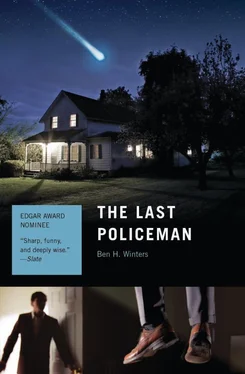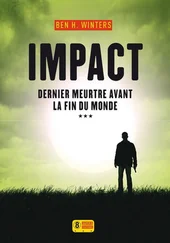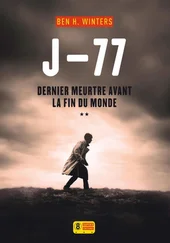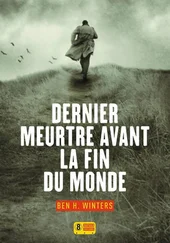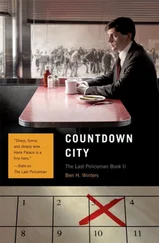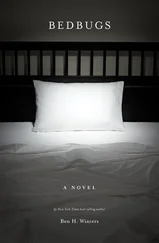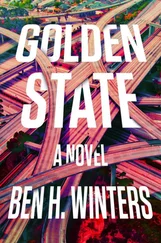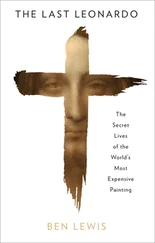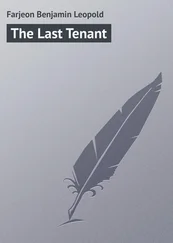“Hello? Denny?”
“So, okay, so you have a lead on the vehicle.”
“Yes. And you said to keep you apprised if there was any real chance it’s more than a hanger.”
“Did I?”
“Yeah. And I think there is, sir, I think there is a real chance. I’m going to swing over there this morning, talk to the guy, and if it looks like anything, I’ll come back to you and we can get a warrant, right?” I trail off. “Mr. Dotseth?”
He clears his throat. “Detective Palace? Who’s your detective-sergeant these days?”
“Sir?”
I wait, my hand still poised over my notebook, my fingers curling over the address: 77 Bow Bog Road. It’s just south of us, in Bow, the first suburb over the city line.
“Down in Adult Crimes. Who is supervising the division?”
“Uh, no one, I guess. Chief Ordler, technically. Sergeant Stassen went Bucket List at the end of November, I think, before I even moved upstairs. A replacement appointment is pending.”
“Right,” says Dotseth. “Okay. Pending. Respectfully, buddy: you want to follow the case, follow the damn case.”
“Petey’s not dead.”
“He is.”
“Just hung out with him. Couple days ago. Tuesday night, I think.”
“No, sir, you didn’t.”
“Think I did.”
“Actually, sir, it was Monday.”
I’m at the bottom of a metal extension ladder that’s leaned against the side of a house, a squat frame house with a sharp shingle roof. My hands are cupped together, my head is tilted back, and I’m calling up through a light drift of snow. J. T. Toussaint, an unemployed construction worker and quarryman, a giant of a man, is up on the ladder, heavy tan work boots planted on the topmost metal rung, a considerable stomach balanced against the overhanging gutters of his roof. I can’t yet clearly see his face, just the lower-right quadrant of it, turned down toward me, framed inside the hood of a blue sweatshirt.
“You picked him up from his place of employment on Monday evening.”
Toussaint makes a noise for “oh yeah?” but elided into one thick uncertain utterance: “Ohuh?”
“Yes, sir. In your red pickup truck, with the American flag on the side. That’s your truck right there?”
I point to the driveway, and Toussaint nods, shifts his weight against the rain spout. The base of the ladder trembles a little.
“On Tuesday morning he was found dead.”
“Oh,” he says, up on the roof. “Damn. A hanger?”
“That’s how it looks. Will you come down off the ladder, please?”
It’s an ugly block of a house, wooden and dilapidated and uneven, like the torso of a soapbox racer left forgotten in the dirt. In the front yard is a single ancient oak tree, crooked branches reaching for the sky as if under arrest; around the side there’s a doghouse and a row of thick, untended thorn bushes along the property line. As Toussaint descends, the ladder’s metal legs jerk back and forth alarmingly, and then he’s standing there in his hooded sweatshirt and his heavy workingman’s boots, a caulking gun dangling loosely from one thick fist, looking me up and down, both of us breathing cold puffs of condensation.
It’s true what everyone has been saying, he’s a big man, but he’s big and solid, the sturdily formed weight of someone who used to play football. There’s a steel in his bigness, and he looks like he could run and jump if he had to. Throw a tackle if he had to. Toussaint’s head is like a brick of granite: jutting oblong jaw, broad forehead, the flesh hard and mottled, as if irregularly eroded.
“My name is Detective Henry Palace,” I say. “I’m a policeman.”
“No kidding,” he says, and then he takes a big sudden lunging step toward me, yelps twice sharply and claps his hands, and I jerk backward, startled, fumble for my shoulder holster.
But it’s just a dog, he’s calling his dog. Toussaint squats and it scampers over, a scruffy thing with patchy curls of white fur, some kind of poodle or something.
“Hey, Houdini,” he says, opens his arm. “Hey, boy.”
Houdini rubs his small face along Toussaint’s meaty palm, and I’m trying to get it together, take a deep breath, and the big man looks up at me from his crouch, amused, and he can tell, I know he can—he can see right through me.
* * *
The house is ugly and dull inside, with dingy walls of yellowing plaster, every ornamentation strictly functional: a clock, a calendar, a bottle opener bolted to the doorframe of the kitchen. The small fireplace is filled with garbage, empty bottles of imported beer—expensive stuff when even the cheap brands are price controlled by ATF at $21.99 for a six-pack, ranging a lot higher on the black market. As we walk past, a bottle of Rolling Rock slips free from the pile and rattles across the hardwood of the living room.
“So,” I say, pulling out a blue book and a pen. “How do you know Peter Zell?”
Toussaint lights a cigarette and slowly inhales before answering. “From grammar school.”
“Grammar school?”
“Broken Ground. Right up the street, here. Curtisville Road.” He tosses his caulking gun into a toolbox, kicks the toolbox under the beat-up sofa. “Sit if you want, man.”
“No, thanks.”
Toussaint doesn’t sit either. He lumbers past me into the kitchen, cigarette exhaust swirling up around his head like dragon-smoke.
There’s a scale model of the New Hampshire state house on the mantel above the fireplace, six inches high and fastidiously detailed: the white stone facade, the gilded dome, the tiny imperious eagle jutting from the top.
“Like that?” says Toussaint when he comes back in, holding a Heineken by the neck, and I set the model down abruptly. “My old man made that.”
“He’s an artist?”
“He’s dead,” he says, and flips open the dome, revealing the inside to be an ashtray. “But yeah, an artist. Among other things.”
He taps his ash into the inverted dome of the state house and looks at me and waits.
“So,” I say. “Grammar school.”
“Yeah.”
According to Toussaint, he and Peter Zell had been best friends from the second grade through the sixth. Both were unpopular, Toussaint a poor kid, a free-breakfast kid, wearing the same dime-store clothes every day; Zell well-off but painfully awkward, sensitive, a born victim. So they formed a bond, two little weirdos, played ping-pong in the Zells’ finished basement, rode their bikes up and down the hills around the hospital, played Dungeons & Dragons in this very house, right where we’re sitting now. Summertime, they’d ride the couple miles to the quarry on State Street, past the jail, strip down to their underpants and dive in, splash around, dunk each other’s heads under the cold fresh water.
“You know,” Toussaint concludes, smiling, enjoying his beer. “Kid stuff.”
I nod, writing, intrigued by the mental picture of my insurance man as a child: the pasty adolescent body and the thick glasses, clothes carefully folded at the lip of the swimming hole, the young version of the obsessive, timid actuary he was destined to become.
J. T. and Peter, as was perhaps inevitable, drifted apart. Puberty hit and Toussaint got tough, got cool, started shoplifting Metallica CDs from Pitchfork Records and sneaking beers and smoking Marlboro Reds, while Zell remained locked in the stiff and permanent contours of his character, rigid and anxious and geeky. By middle school they would nod to each other in the hallway, and then Toussaint dropped out and Peter graduated and went to college and then twenty years passed without a word between them.
I write it all down. Toussaint finishes his beer and tosses the empty into the pile in the fireplace. There are small gaps in the joinings of the house’s wooden sides, or there must be, because in the pauses in our conversation there’s a howling whistle, the wind whipping around out there, intensified as it tries to slide in through the cracks.
Читать дальше
